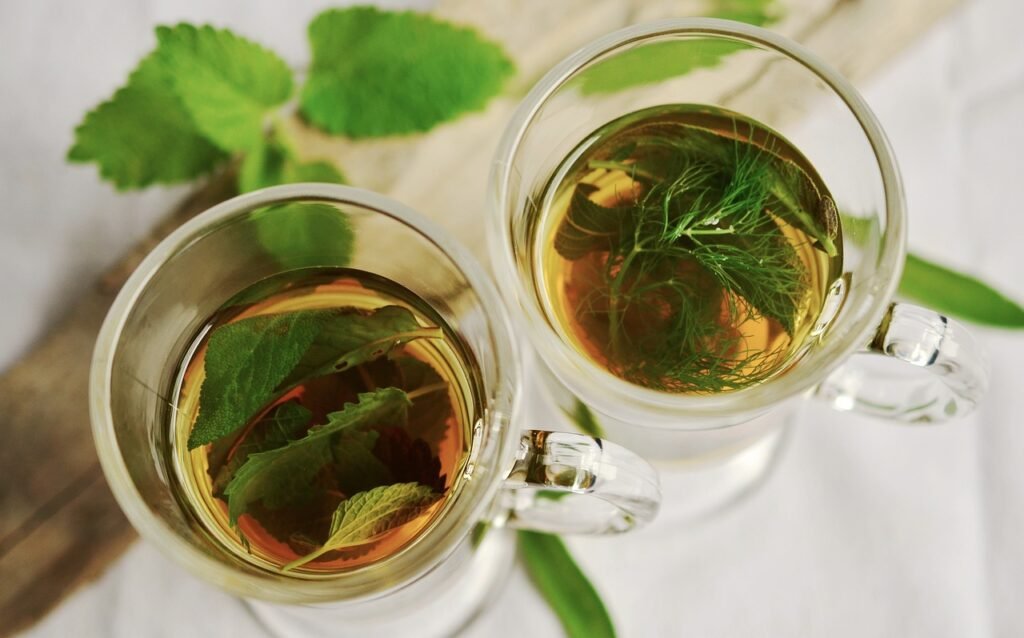Herbal teas have long been celebrated across various cultures for their unique flavors, therapeutic properties, and overall health benefits. Unlike traditional caffeinated teas which are derived from the Camellia sinensis plant, herbal teas are made from a diverse array of plant materials, including herbs, flowers, fruits, and spices.
This diversity contributes to the myriad of health advantages attributed to these beverages, making them a popular choice for individuals seeking natural remedies and holistic wellness.
The popularity of herbal teas can be traced back through history and is evident in numerous cultures around the globe. For instance, in Chinese culture, herbal teas have been utilized for thousands of years for medicinal purposes, while in Western traditions, chamomile tea has been widely recognized for its calming effects and digestive properties.
As society shifts towards greater health consciousness, the demand for herbal teas continues to rise, as they are frequently promoted as alternatives to sugary drinks and caffeinated beverages.
In addition to providing soothing warmth and enjoyment, many herbal teas are believed to possess medicinal properties, which vary according to their ingredients. Berberine tea, derived from the roots of plants such as Goldenseal and Barberry, is gaining attention for its potential health benefits, particularly in relation to weight loss and diabetes management.
Similarly, chamomile tea is renowned for its relaxing qualities and may help in alleviating anxiety and improving sleep quality. As we delve deeper into the comparison of berberine tea vs chamomile tea, it becomes evident that each variation carries its unique benefits and applications. In exploring these two herbal teas, we aim to better understand their contributions to overall health and well-being.
What is Berberine Tea?
Berberine tea is a herbal infusion that draws its active ingredient, berberine, from various plants, including goldenseal, barberry, and tree turmeric. Known for its bright yellow color, berberine has been utilized in traditional medicine for centuries, particularly in ancient Chinese and Ayurvedic practices.
This compound is a type of isoquinoline alkaloid and is recognized for its potential health benefits, making it a subject of interest in contemporary health and wellness discussions.
The preparation of berberine tea typically involves steeping dried berberine-containing herbs in hot water. The process allows the beneficial compounds, particularly berberine, to leach into the water, resulting in a fragrant beverage. This tea not only offers a unique flavor profile but also enhances the accessibility of berberine’s health benefits, as it can be consumed easily and conveniently as part of daily routines.
There are numerous advantages linked with berberine tea, particularly regarding weight loss and diabetes management. Research suggests that berberine may help regulate blood sugar levels, thus proving beneficial for individuals with type 2 diabetes.
It is believed to enhance insulin sensitivity and reduce glucose production in the liver, leading to improved metabolic functions. Moreover, berberine is said to accelerate fat metabolism, which can assist in achieving weight loss goals when combined with a healthy diet and regular exercise.
Aside from these two primary benefits, berberine also possesses anti-inflammatory and antioxidant properties, which may contribute to overall health enhancement.
These attributes position berberine tea as a valuable addition to health-focused lifestyles, especially when comparing its effects to chamomile tea, which is often recognized for its calming properties. Nonetheless, each tea offers distinct benefits, making the choice between berberine tea vs chamomile tea a matter of personal health objectives and preferences.
Understanding Chamomile Tea
Chamomile tea, derived from the dried flowers of the Asteraceae family, is renowned for its calming and soothing properties. Traditionally valued in various cultures, chamomile has been utilized for centuries as a natural remedy for a variety of ailments, ranging from insomnia to digestive disorders.
The primary source of chamomile tea comes from two main species: German chamomile (Matricaria chamomilla) and Roman chamomile (Chamaemelum nobile). Both varieties are celebrated for their mild flavor and therapeutic benefits.
The calming effects of chamomile tea are perhaps its most well-recognized attribute. Due to its high concentration of antioxidants, particularly apigenin, chamomile is believed to have sedative properties that can help promote sleep and alleviate anxiety. Additionally, chamomile tea is often recommended to assist with digestive issues; it may help reduce bloating, minimize gas, and promote overall digestive health. This makes it particularly appealing for individuals seeking natural remedies for gastrointestinal discomfort.
Beyond its calming nature and digestive benefits, chamomile tea supports general wellness. Its antioxidant and anti-inflammatory properties can aid in boosting the immune system and preventing various chronic diseases. Furthermore, chamomile tea is often considered to have mild analgesic effects, which may provide relief from headaches and minor pains.
However, when comparing chamomile tea vs berberine tea, there are notable limitations. While chamomile is excellent for relaxation and digestive support, it does not offer the same extensive benefits for weight loss and diabetes management as berberine. Berberine, a compound found in several plants, has been shown to enhance metabolic health more effectively. Consequently, those looking to address specific health concerns may find that chamomile tea serves best as a complementary remedy rather than a primary solution.
Nutritional Components of Berberine Oolong Mint Tea
Berberine Oolong Mint Tea is a unique blend that combines three significant components: berberine, oolong tea, and mint. Each of these ingredients contributes distinct nutritional benefits, and their synergy offers a holistic approach to health, particularly in the realms of weight loss, blood sugar regulation, and appetite control.
Berberine, a bioactive compound found in several plants, is renowned for its potential to aid in metabolism and glucose management. Research has shown that berberine can enhance insulin sensitivity and lower blood sugar levels, making it a favorable option for individuals managing diabetes.
Moreover, berberine has also been associated with weight loss, as it may encourage fat loss by improving the regulation of lipids and reducing fat storage in the body. These properties make berberine a key player in the battle against obesity and metabolic disorders.
Oolong tea, another vital ingredient in this blend, is a traditional Chinese tea known for its health-promoting properties. It is partially oxidized, which provides a unique chemical composition rich in catechins, a type of antioxidant. These antioxidants are significant in enhancing metabolism and may aid in fat oxidation during exercise.
Furthermore, oolong tea has been linked to improved digestion and may play a role in regulating appetite, further supporting weight loss efforts. The combination of caffeine and other compounds in oolong tea may also provide an energy boost, promoting a more active lifestyle.
Lastly, mint adds flavor as well as digestive benefits to the mix. Mint is known for its calming properties on the digestive tract and may aid in alleviating bloating and discomfort. Its pleasant aroma and taste can enhance the overall experience of consuming berberine oolong mint tea, encouraging regular intake as part of a healthy lifestyle.
Together, these components create a beverage that not only delights the palate but also works synergistically to support out-of-the-ordinary health benefits, especially in the context of the berberine tea vs chamomile tea discussion.
Comparative Health Benefits: Berberine vs. Chamomile
When comparing the health benefits of berberine tea and chamomile tea, it is evident that each offers unique advantages that cater to different health concerns. Berberine, a bioactive compound found in several plants, has gained attention for its potential in managing weight and controlling blood sugar levels.
Studies indicate that berberine can enhance insulin sensitivity, which is crucial for individuals dealing with diabetes or metabolic disorders. Moreover, this compound has been shown to aid in reducing body weight, particularly when combined with a balanced diet and physical activity.
For example, research conducted on obese individuals revealed that berberine significantly lowered their body mass index (BMI) and waist circumference after several weeks of consumption.
Chamomile tea, on the other hand, is well-known for its calming effects and has been traditionally used for promoting relaxation and aiding sleep. It contains several antioxidants, which contribute to its anti-inflammatory properties.
While chamomile may not directly aid in weight loss or blood sugar regulation to the extent of berberine, it can play a supportive role in overall wellness by promoting restful sleep and reducing stress, factors that are crucial for maintaining a healthy weight and metabolic function.
Some recent studies suggest that the calming effects of chamomile can help mitigate emotional eating, which is a significant struggle for many aiming for weight loss.
In terms of overall health, berberine appears to be more potent with studies revealing its capability to lower cholesterol levels and improve heart health. In comparison, chamomile tea is beneficial for digestive health and has been linked to lower risks of gastrointestinal issues.
While both berberine tea vs chamomile tea serve distinct purposes, the effectiveness of berberine in managing specific health conditions stands out. By understanding their respective benefits, individuals can make informed decisions about which tea aligns more closely with their health objectives.
Weight Loss: A Closer Look at Berberine Oolong Mint Tea
Berberine Oolong Mint Tea has garnered attention for its potential weight loss benefits, making it a relevant topic in the ongoing discussion of berberine tea vs chamomile tea.
This unique blend combines the properties of berberine, known for its metabolic-boosting effects, with oolong and mint, both of which contribute to improved digestion and a pleasant flavor.
One of the primary mechanisms through which berberine aids weight loss is by enhancing metabolism. Studies indicate that berberine can activate AMP-activated protein kinase (AMPK), an enzyme that regulates energy balance and enhances fat burning.
Furthermore, berberine may improve insulin sensitivity, which is crucial for effective weight management. By facilitating better glucose metabolism, it aids in reducing fat accumulation, especially in those with metabolic disorders.
Research has shown that consuming berberine can result in significant reductions in body weight and body mass index (BMI), positioning it as a formidable option for individuals seeking to lose weight.
User testimonials further support the positive impact of this tea on weight management. Many individuals report not only weight loss but also increased energy levels and improved overall health after incorporating Berberine Oolong Mint Tea into their daily routines. The combination of its ingredients not only makes it enjoyable but also maximizes its health benefits when consumed regularly.
Additionally, understanding how this tea compares in efficacy with chamomile tea is essential. While chamomile tea offers relaxation and digestive benefits, it lacks the specific components that support metabolism and fat oxidation found in berberine.
Therefore, for those focusing on weight loss through dietary choices, berberine tea emerges as a preferable option. Scientific research continues to shed light on these mechanisms, reinforcing the idea that Berberine Oolong Mint Tea may be a valuable ally in the pursuit of weight management.
Diabetes Management: How Berberine Helps
Diabetes management is a critical aspect of maintaining overall health, particularly for individuals diagnosed with type 2 diabetes. One of the promising natural supplements that have emerged in recent years is berberine, a compound derived from several plants, which has demonstrated significant potential in supporting diabetes management. The research surrounding berberine indicates that it can enhance insulin sensitivity, a crucial factor in regulating blood sugar levels.
Insulin sensitivity refers to how effectively the body’s cells respond to insulin, which is responsible for facilitating the uptake of glucose from the bloodstream.
By improving insulin sensitivity, berberine can help lower blood sugar levels and improve the overall metabolic profile of individuals with diabetes. Studies have shown that berberine influences various metabolic pathways, aiding in glucose metabolism and promoting better control over blood sugar fluctuations.
Beyond its impact on insulin sensitivity, berberine may also contribute to other aspects of glucose metabolism by reducing the production of glucose in the liver, inhibiting intestinal absorption of glucose, and enhancing the body’s glucose utilization.
These multifaceted mechanisms make berberine a valuable component of a diabetic-friendly dietary regimen. Incorporating berberine oolong mint tea can provide not only the benefits of berberine but also the soothing qualities of chamomile, making it an appealing choice for those looking to manage their diabetes naturally.
Moreover, consumers can easily integrate this tea into their daily routines, serving as a strategic addition to meals or consumed as a refreshing beverage throughout the day. As more individuals explore the potential benefits of berberine tea vs chamomile tea, it becomes evident that the synergy between these natural elements can significantly enhance diabetes management strategies, ultimately leading to a healthier lifestyle.
Overview of Overall Health Benefits of Berberine Oolong Mint Tea
Berberine oolong mint tea offers a myriad of health benefits that can significantly contribute to overall well-being. Derived from the berberine compound found in various plants, this tea is often compared with chamomile tea due to its unique properties. One of the primary advantages of berberine tea is its potential to support heart health.
Research suggests that berberine can aid in managing cholesterol levels, thus reducing the risk of cardiovascular diseases. By lowering LDL cholesterol and triglycerides, individuals consuming this tea may find a natural ally in promoting heart wellness.
Furthermore, berberine oolong mint tea is recognized for its anti-inflammatory effects. Chronic inflammation is a contributing factor to numerous health issues, including arthritis, obesity, and even certain cancers.
The anti-inflammatory properties of berberine can help mitigate these risks, enhancing overall health. As a result, regular consumption of this tea may assist in maintaining a balanced immune response, making it a prudent choice for those aiming to bolster their health.
Another significant benefit of berberine oolong mint tea is its role in digestive support. Berberine has been shown to regulate gut health by promoting the growth of beneficial gut bacteria and inhibiting harmful microorganisms.
By fostering a healthier gut environment, this tea can improve digestion and may alleviate symptoms of gastrointestinal discomfort. This is particularly relevant when contrasted with chamomile tea, which is typically favored for its calming effects on the stomach.
In summary, the holistic benefits of berberine oolong mint tea make it a noteworthy contender in the health and wellness domain. With its potential to improve heart health, reduce inflammation, and support digestive function, this tea stands out for those seeking a natural approach to enhancing their overall health.
Conclusion: Choosing the Best Tea for Your Health
In the ongoing comparison of berberine tea vs chamomile tea, it becomes increasingly evident that each type of tea offers distinct benefits suited to varying health goals. Berberine oolong mint tea stands out due to its multifaceted advantages for weight loss, diabetes management, and overall health improvement.
As demonstrated throughout this discussion, the potent compounds found in berberine have been shown to help regulate metabolism, enhance insulin sensitivity, and support digestive health, making it a valuable addition for those aiming to lose weight or manage blood sugar levels.
On the other hand, chamomile tea is revered for its calming properties and ability to promote restful sleep. This may make it a preferred choice for individuals seeking stress relief and improved sleep hygiene.
However, those focusing on more active health management or weight loss may find that berberine oolong mint tea aligns more closely with their objectives. The additional health benefits derived from berberine’s unique compounds offer a compelling case for its inclusion in one’s wellness routine.
When considering these options, it is essential for readers to reflect on their personal health goals. For someone prioritizing metabolic health or weight loss, incorporating berberine tea into their daily regimen might be the way forward.
Simple ways to enjoy this tea could include sipping it in the morning to kickstart metabolism or having a cup during the afternoon to stave off cravings. Ultimately, the choice between berberine tea and chamomile tea should align with individual health aspirations and lifestyle. Recognizing one’s specific needs will ensure that the tea chosen serves as an effective ally on the journey to wellness.
Here is a table comparing Oolong, Mint, Berberine Tea vs. chamomile Tea:
| Feature | Berberine Oolong Mint Tea | Chamomile Tea |
| Main Ingredients | Berberine, Oolong tea leaves, Mint | Dried chamomile flowers |
| Caffeine Content | Moderate (from oolong tea) | Caffeine-free |
| Primary Benefits | – May support blood sugar control – Aids in weight management – Boosts metabolism – Enhances gut health | – Promotes relaxation – Reduces anxiety – Improves sleep quality – Soothes digestive issues |
| Flavor Profile | Earthy and slightly bitter with a refreshing minty undertone | Floral, mild, and slightly sweet |
| Best Time to Consume | Morning or early afternoon (due to caffeine content) | Evening (to promote relaxation and sleep) |
| Potential Side Effects | – May cause stomach upset if consumed in large quantities – Not suitable for people on certain medications (e.g., antibiotics, blood thinners) | – Rare allergic reactions in those sensitive to ragweed or related plants |
| Target Audience | People managing blood sugar, aiming for weight loss, or boosting metabolism | Individuals seeking relaxation, stress relief, or improved sleep |
| Preparation Time | 3–5 minutes (requires steeping oolong leaves) | 5–7 minutes (steeping dried flowers) |
| Additional Notes | Often marketed as a health supplement for metabolic and weight goals | Widely used as a natural remedy for relaxation and better sleep |



